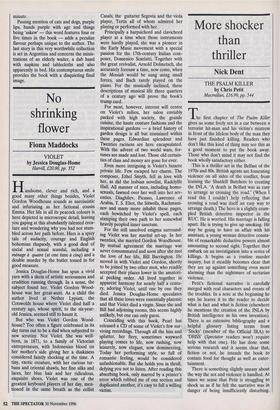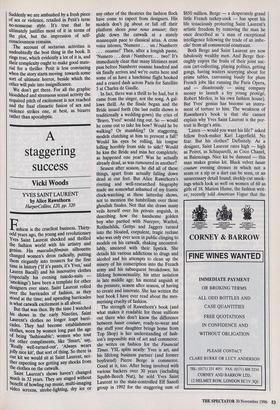More shocker than thriller
Nick Dent
THE PSALM KILLER by Chris Petit Macmillan, 116.99, pp. 544 The first chapter of The Psalm Killer gives us some lively sex in a car between a terrorist hit-man and his victim's mistress in front of the lifeless body of the man they have just finished killing. Readers who don't like this kind of thing may see this as a good moment to put the book away. Those who don't mind it may not find the book wholly satisfactory either.
This is a thriller set in the Belfast of the 1970s and 80s. British agents are fomenting violence on all sides of the conflict, from 'training the Shankill Butchers to creating the INLA. 'A death in Belfast was as easy to arrange as crossing the road.' (When I read this I couldn't help reflecting that crossing a road was itself an easy way to arrange death.) The hero is a slightly crum- pled British detective inspector in the RUC. He is worried. His marriage is falling apart. He is trying to give up smoking. He may be going to have an affair with his assistant, a young woman detective consta- ble of remarkable deductive powers almost amounting to second sight. Together they embark on an investigation into a series of killings. It begins as a routine murder inquiry, but it steadily becomes clear that they are up against something even more alarming than the nightmare of sectarian violence.
Petit's fictional narrative is carefully merged with real characters and events of the troubles. In a note at the beginning he says he leaves it to the reader to decide what is fact and what is fiction (elsewhere he mentions the creation of the INLA by British intelligence as his own invention). There is an extensive bibliography and a helpful glossary listing terms from 'Sticky' (member of the Official IRA) to 'DHSS' (Spectator readers won't require help with that one). He has done some serious research and it seems clear that, fiction or not, he intends the book to contain food for thought as well as enter- tainment.
There is something slightly uneasy about the way the sex and violence is handled. At times we sense that Petit is struggling to shock us as if he felt the narrative was in danger of being insufficiently disturbing. Suddenly we are ambushed by a fresh piece of sex or violence, retailed in Petit's terse no-nonsense style. It's true that he ultimately justifies most of it in terms of the plot, but the impression of self- consciousness remains.
The account of sectarian activities is undoubtedly the best thing in the book. It rings true, which evidently a lot of it is, and their complexity ought to make good mate- rial for a thriller. Petit is less convincing when the story starts moving towards some sort of ultimate horror, beside which the other will pale into insignificance. We don't get there. For all the graphic bloodshed and strenuous sexual activity the required pitch of excitement is not reached and the final climactic fusion of sex and violence strikes one, at best, as bizarre rather than apocalyptic.



















































































 Previous page
Previous page